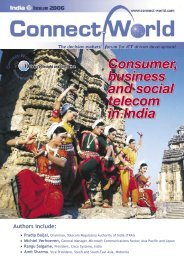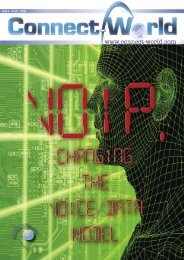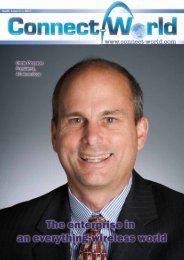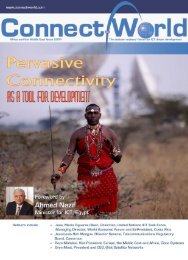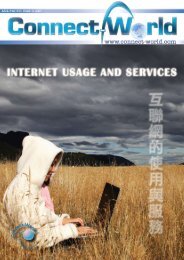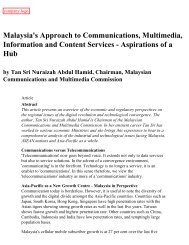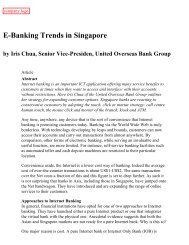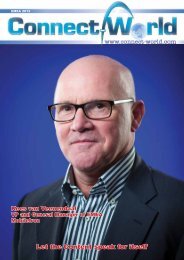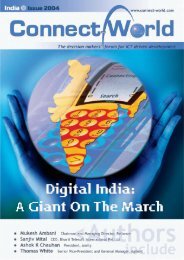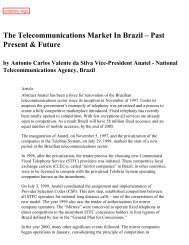Contents - Connect-World
Contents - Connect-World
Contents - Connect-World
Create successful ePaper yourself
Turn your PDF publications into a flip-book with our unique Google optimized e-Paper software.
Mobile Data<br />
Mobile data adoption and over-the-air device management<br />
by Olivier Graëff, co-founder and co-CEO of Swapcom<br />
Mobile operators in developing countries are attempting to popularise data services.<br />
SMS, multimedia, games and such play a major role familiarising users with mobile data.<br />
Once accustomed to data, users are more likely to use more serious, useful applications.<br />
Nevertheless, the complexities and costs of serving these relatively unsophisticated users<br />
challenge operators. Device recognition software permits over-the-air troubleshooting,<br />
bug patching, service updates and service installation, reduce the costs, make usage simpler<br />
for the customer and promote usage of advanced services.<br />
Olivier Graff is a co-founder and co-CEO of Swapcom. After studying sociology and applied computer<br />
science in Lyon, Olivier gained experience in the IT sector working as New Technologies Project<br />
Manager for Prosodie, French IT and Telecoms facilitator. Mr Graff subsequently worked in the development<br />
and sales departments of Mediaprogrs, an IT company specialised in online Videotext services.<br />
Mr Graff was recently invited by French President Jacques Chirac to take part in an official delegation<br />
of French businesses on a presidential tour of Vietnam. When not at work, Olivier is actively involved<br />
in the electronic music scene and enjoys composing music.<br />
Mr Graff holds a bachelors degree in Sociology and Applied Computer Sciences.<br />
In the telecoms industry, new technologies<br />
are emerging all the time and<br />
so are marketing opportunities, along<br />
with the hitches, the bugs and the costcutting<br />
guidelines.<br />
When designing end-to-end mobile<br />
solutions, one must cast a wide net and<br />
draw on experience to gain an accurate<br />
vision not only of emerging opportunities,<br />
but also of emerging headaches<br />
within the mobile technology sphere.<br />
That means listening attentively to<br />
operator needs, weighing the constraints<br />
and opportunities linked to<br />
size and demography, then trying to<br />
respond in the most effective and efficient<br />
way.<br />
The challenges facing multimedia<br />
take-up in areas of low literacy, for<br />
instance, are certainly far from those<br />
facing operators in the western world<br />
where converging technologies are<br />
calling for more profiling, more<br />
remote CRM (Customer Relationship<br />
Management) and more transmission<br />
tools to ensure seamless data delivery.<br />
From the poorest regions in the world,<br />
to the most hi-tech, delivering mobile<br />
multimedia services in the most appropriate<br />
way is an important concern.<br />
The majority of mobile networks in<br />
developing countries are attempting to<br />
make their first GSM data services<br />
popular. In these regions, SMS is playing<br />
a major role in familiarising users<br />
with mobile data.<br />
In many areas of sub-Saharan Africa,<br />
Asia and the Pacific, the poor understanding<br />
of technology and the low<br />
level of literacy are major drawbacks in<br />
promoting data applications.<br />
However, strong interest in mobile<br />
phone culture is encouraging young<br />
subscribers to read and use digital<br />
information.<br />
Local mobile content providers are<br />
well aware of the constraints of cultural<br />
awareness. They are often astute in<br />
defining trends and starting fashion<br />
crazes. Even simple mobile messaging<br />
content, such as ringtones, is an exciting<br />
way for young people in regions<br />
new to mobile telephonywho have<br />
never had even landline telephones<br />
to communicate with each other.<br />
It is a means of drawing youth towards<br />
information technology. Music festivals<br />
and roadshows are a way of drawing<br />
young people to see demonstrations<br />
of mobile services. In Kenya for<br />
instance, young music fans have been<br />
enticed to use SMS services by the<br />
opportunity to download a preview of<br />
a music clip by a popular rap artist.<br />
These are the youths who will become<br />
the prescribers of mobile culture and<br />
who will teach peers and family how to<br />
use them.<br />
Another means of raising data awareness<br />
among these communities is by<br />
running SMS voting in connection<br />
with with television programmes.<br />
Unaccustomed viewers learn how to<br />
follow a logical sequence of commands<br />
from instructions displayed on the TV<br />
screen. By selecting the keys one, two,<br />
or three and scrolling to vote, they gain<br />
confidence in their ability to use modern<br />
IT tools. What SMS is actually<br />
doing is taking the fear of technology<br />
away by making it fun to use.<br />
Mobile entertainment is a first step<br />
towards modernising daily life. Some<br />
countries exploring mobile multimedia<br />
content development are choosing<br />
to provide more useful daily services<br />
over the mobile. A mobile information<br />
portal implemeted on a network can<br />
53




